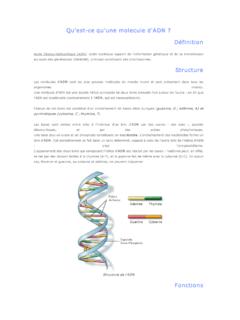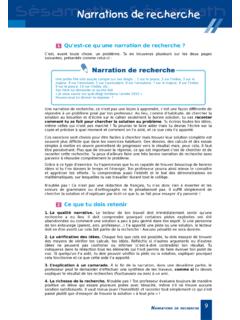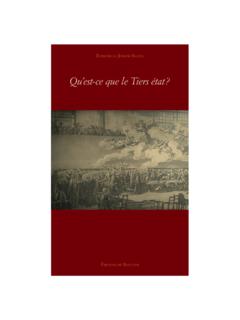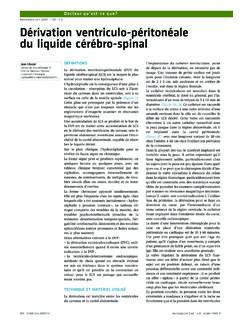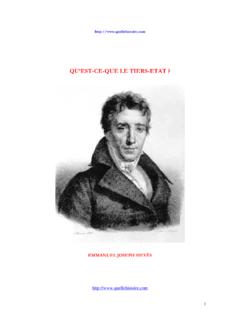Transcription of th Qu’est-ce qu’une nation? - UC Paris
1 Ernest Renan, what is a Nation? , text of a conference delivered at the Sorbonne on March 11th, 1882, in Ernest Renan, Qu'est- ce qu 'une nation?, Paris , Presses-Pocket, 1992. (translated by Ethan Rundell). I propose to analyze with you an idea which, though apparently clear, lends itself to the most dangerous misunderstandings. The forms of human society are of the greatest variety. They include great agglomerations of men after the fashion of China, Egypt, and ancient Babylonia; tribes such as the Hebrews and the Arabs; city-states on the Athenian and Spartan model; reunions of diverse countries such as were to be found under the Carolingian Empire; communities such as the Israelites and the parsis, lacking a country and maintained by religious bonds; nations like France, England, and most other modern, autonomous polities; confederations after the fashion of Switzerland and America; the great families that race, or rather language, has established between the different branches of Germans, the different branches of Slavs.
2 Such are the types of groupings that exist, or rather existed, and that one confuses only at the price of the most serious inconvenience. At the time of the French Revolution, many believed that the institutions of small independent cities such as Sparta and Rome could be applied to our great nations of thirty or forty million souls. In our days, a yet greater error is committed: one confounds the idea of race with that of the nation and attributes to ethnographic, or rather linguistic, groups a sovereignty analogous to that of actually existing peoples. Let's try to achieve some precision in regards to these difficult questions, questions in which the least confusion over the meaning of words in the first steps of the reasoning process can produce by the end the most disastrous errors. what we are going to do is a delicate operation, indeed, it is nearly vivisection: we are going to treat the living as one ordinarily treats the dead.
3 We shall keep them cold, however, with the most absolute impartiality. I. Since the end of the Roman Empire or, better yet, since the break up of Charlemagne's Empire, western Europe has appeared to be divided into nations , certain of which, at certain moments, have sought to exercise hegemony over the others without ever having succeeded in a lasting fashion. what Charles V, Louis XIV, and Napoleon I. were unable to do, it is likely that no one shall do in the future. The establishment of a new Roman or Charlemagnian Empire has become an impossibility. The division of Europe has reached such a point that any attempt at universal domination too quickly provokes a coalition that returns the ambitious nation to its natural frontiers. A sort of equilibrium has been long established. France, England, Germany, and Russia shall for hundreds of years remain, and despite whatever they will have experienced in the meantime, historic individuals, the essential pieces of a checkerboard whose squares vary ceaselessly in importance and grandeur without ever fully being lost in one another.
4 Understood in this way, nations are something rather new in history. Antiquity did not know them: Egypt, China, and ancient Chaldea were in no sense nations . They were herds led by a child of the Sun or of the Sky. They were no Egyptian citizens, no more than there were Chinese ones. Classical antiquity had its republics and its municipal kingdoms, its confederations of local republics, its empires; it hardly had a nation in the sense that we understand it. Athens, Sparta, Sidon, and Tyr were small centers of admirable patriotism but they were cities with relatively restrained territory. Prior to their absorption into the Roman Empire, Gaul, Spain, and Italy were assemblages of peoples, often comprising leagues between themselves but without central institutions or dynasties. The Assyrian, Persian, and Alexandrine Empires also did not constitute fatherlands.
5 There were never any Assyrian patriots; the Persian Empire was one great fief. Not a single nation finds its origins in Alexander's colossal adventure, otherwise so rich in consequences for the general history of civilization. The Roman Empire was much nearer to being a fatherland. In response to the cessation of wars, Roman domination, at first so hard, quickly came to be loved. It was a grand association synonymous with order, peace, and civilization. In the last days of the Empire, there was to be found among elevated souls, enlightened bishops, and the literate a genuine sentiment for the Roman peace that one opposed to the menacing chaos of barbarous countries. But an empire twelve times the size of present-day France does not constitute a state in the modern sense of the word. The schism between the East and the West was inevitable.
6 The attempts to found a Gallic empire in the third-century did not succeed. It was the Germanic invasions which introduced in the world the principle that, later on, would come to serve as the basis for the existence of nationalities. what did the Germanic peoples do between the great invasions of the fifth- century until the last Norman conquests in the tenth? They had little effect on the races they encountered but they imposed dynasties and a military aristocracy on the more or less important portions of the ancient Western Empire and lent their names to these places. It is here that France, Burgundy, Lombardy, and, later on, Normandy find their origins. The rapid preponderance achieved by the Frankish Empire briefly restored the unity of the West but this Empire was irredeemably shattered around the middle of the ninth-century.
7 The Treaty of Verdun traced divisions that were in principle immutable. From that point on, France, Germany, England, Italy, and Spain were to travel, by frequent detours and across a thousand adventures, towards the full national existence we today see blossoming. what characterizes these different states? It's the fusion of the populations that comprise them. In the countries that we have enumerated, there is nothing analogous to what you find in Turkey, where the Turk, the Slav, the Greek, the Armenian, the Arab, the Syrian, and the Kurde are as distinct today as they were the day of the conquest. Two essential circumstances have contributed to this result. The first is the fact that the Germanic peoples adopted Christianity as soon as they had some extended contact with Greek and Latin peoples.
8 When the conqueror and the conquered are of the same religion, or rather when the conqueror adopts the religion of the conquered, the Turkish system of making absolute distinctions on the basis of religion is no longer possible. The second circumstance is the fact that the conquerors forgot their own language. The grandsons of Clovis, of Alaric, of Gondebaud, of Alboin, and of Rollon already spoke roman. This fact was itself the consequence of another important particularity: that the Franks, the Burgunds, the Goths, the Lombards, and the Normans had very few women of their race with them. Over several generations, the chiefs married with German women. Their concubines, however, were Latin, their children's nurses were Latin, the entire tribe married Latin women. It was for this reason that the lingua francica and the lingua gothica had only a short history following the appearance of the Franks and the Goths in Roman territories.
9 It was not thus in England: the Anglo-Saxon invasion no doubt included large numbers of women. The original Breton population fled and, as a result, Latin ceased to be indeed, may never have been dominant in Britanny. One may have generally spoken Gallic in fifth-century Gaul; Clovis and his followers at any rate did not abandon German for Gallic. That had the important result that, despite the extreme violence of the German invaders' mores, the mold that they imposed over the centuries became the mold of the nation itself. France very legitimately became the name of a country into which only a very imperceptible minority of Francs had entered. In the first chansons de geste of the tenth-century, so perfect a mirror of their time, all inhabitants of France are French. The idea of a difference of race within the population of France, so evident in the writing of Gregory of Tours, is to no degree to be found among French writers and poets following Hugh Capet.
10 The difference between the nobleman and the vilain is as accentuated as possible but the difference between the one and the other is not at all an ethnic difference. It is a difference of courage and in the hereditary transmission of habits and education. No one has the idea that all of that should have had a conquest as its origin. The false system according to which the nobility owes its origin to a privilege conferred by the king in recognition of services rendered to the nation (such that every noble is in fact ennobled ) first appeared as a dogma beginning in the thirteenth-century. The same thing next happened with all of the Norman conquests. At the end of one or two generations, the Norman invaders no longer distinguished themselves from the rest of the population; for all that, their influence on it was no less profound.
